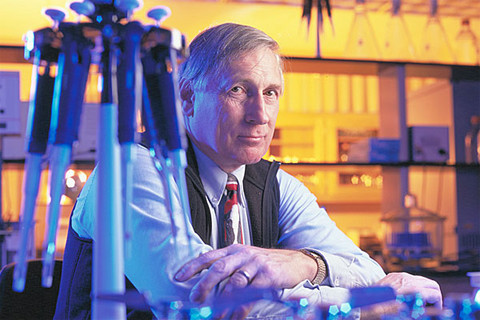June 30, 2014
Dr. Clifton Baile: A Legacy of a GRA Eminent Scholar
By Mike Cassidy

It is said that the mark of a great scientist is not mere brilliance, but tenacity. By that measure, GRA Eminent Scholar Clifton Baile was one of the greatest.
Cliff died May 19 after suffering a cerebral aneurysm. A man who didn’t call in sick a single day in his first 45 years of work – and who faithfully hit the gym, five days a week – suddenly was gone.
What is not gone is the indelible impact he made on the Georgia Research Alliance.
Cliff played an influential role in creating a more entrepreneurial culture at Georgia’s universities, especially UGA. When he arrived on campus in 1995, UGA had its share of breakthroughs and a good portfolio of patents. In the 19 years since, Cliff fostered a what-if mindset so that more lab findings would find their way into the marketplace – and more companies would be born from the work of scientists.
He himself launched or co-launched eight start-ups. He also counseled and mentored other faculty with similar ambitions, stoking the fires of enterprise, helping them recognize the commercial potential of their work, encouraging them to try and keep trying. We can testify that Cliff’s desk was seldom without a business plan under review and evaluation.
Cliff Baile began his career in 1965 as an NIH Health Research Fellow at Harvard. He left academia in 1971 to head neurobiological research for Smith Kline; a decade later, Monsanto recruited him to head biotech research. When he decided in the mid-1990s to leave Monsanto to return to academia, the company employed 5,000 scientists. Only five carried the title of Distinguished Fellow, and Cliff was one of them.
Beyond serving as an entrepreneurial resource for his academic colleagues, Cliff worked to make sure his own university was better-equipped and positioned to make leaps in scientific discovery. He was instrumental in recruiting or retaining three other GRA Eminent Scholars, and he helped procure $37 million in funding for new facilities and state-of-the-art technology. None of this was in his job description. All of it reflects Cliff’s belief that Georgia could be a greater force in research and commercialization.
Late in his career, Cliff put his energy into engineering a collaborative unlike any other in Georgia. Its target: obesity. Aware that one out of three Georgians is obese – one of the highest rates in the nation – he developed a campus-wide initiative that would marshal the collective expertise of Georgia’s flagship university to address the problem. And he did it in pure Cliff Baile fashion. He held 1-to-1 meetings with nearly 200 UGA employees, consulted with colleagues from around the country, raised funds for research and teaching and built bridges with area organizations to roll out the program.
Today, the Georgia Research Alliance is a more powerful engine for turning discoveries into solutions that help people. Because of his conviction and tenacity, Cliff Baile is a major reason why. He will be missed and never forgotten.
